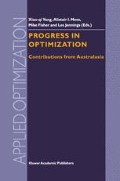Abstract
A train travels from one station to the next along a smooth track with known gradient. The journey must be completed within a given time and it is desirable to minimise fuel consumption. We assume that only certain discrete control settings are possible. This conforms to the most common situation in diesel-electric locomotives. In the case where the track is flat and the train is controlled using a finite sequence of traction controls and a final brake control Cheng and Howlett (1992) have derived necessary and sufficient conditions that define the optimal switching times. In this paper we will show that these conditions can be derived (as necessary conditions) using an elegant argument of restricted variation.
Access this chapter
Tax calculation will be finalised at checkout
Purchases are for personal use only
Preview
Unable to display preview. Download preview PDF.
References
Asnis, I.A., Dmitruk, A.V. and Osmolovskii, N.P. (1985), Solution of the problem of the energetically optimal control of the motion of a train by the maximum principle, U.S.S.R. Comput. Maths. Math.Phys., Vol. 25, No. 6, pp. 37–44.
Cheng, J. and Howlett, P.G. (1992), Application of critical velocities to the minimisation of fuel consumption in the control of trains, Automatica, Vol. 28, No. 1, pp. 165–169.
Cheng, J. and Howlett, P.G. (1993), A note on the calculation of optimal strategies for the minimisation of fuel consumption in the control of trains, IEEE Transactions on Automatic Control, Vol. 38, No. 11, pp. 1730–1734.
Howlett, P.G. (1984), The optimal control of a train, Study Leave Report, School of Mathematics, University of South Australia.
Howlett, P.G. (1990), An optimal strategy for the control of a train, J. Aust. Math. Soc., Ser. B, Vol. 31, pp. 454–471.
Howlett, P.G., Pudney, P.J. and Benjamin, B.R. (1992), Determination of optimal driving strategies for the control of a train, in Computational Techniques and Applications: CTAC91, edited by Noye, B.J., Benjamin, B.R. and Colgan, L.H., pp. 241–248.
Howlett, P.G., Cheng, J., and Pudney, P.J. (1995), Optimal strategies for energy-efficient train control, in Control Problems in Industry (Progress in Systems and Control Theory), edited by Lasiecka, I. and Morton, B., Birkhauser, pp. 151–178.
Howlett, P.G., Milroy, I.P. and Pudney, P.J. (1994), Energy-efficient train control, Control Engineering Practice, Vol. 2, No. 2, pp. 193–200.
Howlett, P.G. (1996), Optimal strategies for the control of a train, Automatica, Vol. 32, No. 4, pp. 519–532.
Howlett, P.G. and Pudney, P.J. (1995), Energy-efficient Train Control, Advances in Industrial Control, Springer-Verlag, London.
Howlett, P.G. and Cheng, J., (1997), Optimal driving strategies for a train on a track with continuously varying gradient, J. Aust. Math. Soc., Ser. B, Vol. 38, pp. 388–410.
Howlett, P.G., Pudney, P.J., Gates, D. and Tarnopolskaya, T. (1997), Optimal driving strategy for a solar car on a level road, IMA Journal of Mathematics Applied in Business and Industry, Vol. 8, pp. 59–81.
Kraft, K.H. and Schnieder, E. (1981), Optimale Trajektrien im Spurgebundenen Schnellverkehr (Optimal Trajectories for Rapid Transit Systems), Regelungstechnik 29. Jahrgang.
Pudney, P.J. and Howlett, P.G. (1994), Optimal driving strategies for a train journey with speed limits, J. Aust. Math. Soc., Ser. B, Vol. 36, pp. 38–49.
Pudney, P.J., Howlett, P.G., Benjamin, B.R. and Milroy, I.P. (1996), Modelling the operational performance of large systems: a railway example, in Computational Techniques and Applications: CTAC-95, (May, R.L. and Easton, A.K. Eds. ), World Scientific, pp. 655–662.
Author information
Authors and Affiliations
Editor information
Editors and Affiliations
Rights and permissions
Copyright information
© 2000 Kluwer Academic Publishers
About this chapter
Cite this chapter
Howlett, P. (2000). A Restricted Variation Argument to Derive Necessary Conditions for the Optimal Control of a Train. In: Yang, X., Mees, A.I., Fisher, M., Jennings, L. (eds) Progress in Optimization. Applied Optimization, vol 39. Springer, Boston, MA. https://doi.org/10.1007/978-1-4613-0301-5_20
Download citation
DOI: https://doi.org/10.1007/978-1-4613-0301-5_20
Publisher Name: Springer, Boston, MA
Print ISBN: 978-1-4613-7986-7
Online ISBN: 978-1-4613-0301-5
eBook Packages: Springer Book Archive

